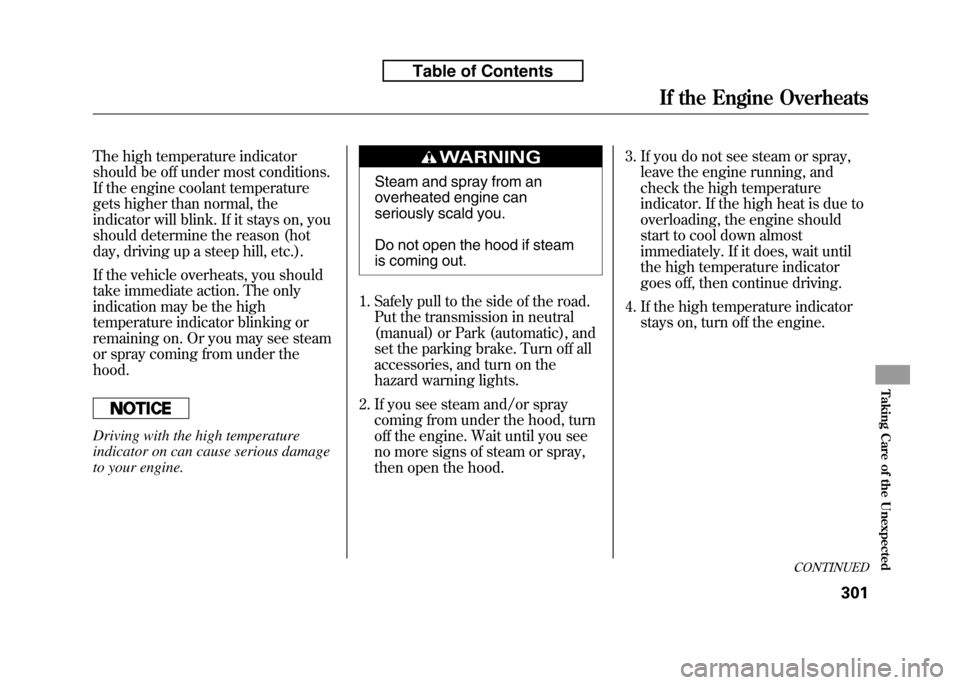2010 HONDA FIT coolant temperature
[x] Cancel search: coolant temperaturePage 2 of 351

Bulb ReplacementBack-up Lights ........................266
Brake Lights ........................... 266
Fog Lights ............................... 265
Front Parking Lights ...............263
Front Side Marker Lights ........263
Front Turn Signal Lights .........264
Headlights .............................. 262
Rear Bulbs .............................. 266
Specifications .......................... 319
Taillights ................................. 266
Turn Signal Lights ..........263, 266
Bulbs, Halogen .......................... 262
C
Capacities Chart .........................319
Carbon Monoxide Hazard ............53
Cargo ......................................... 208
Cargo Hook ................................ 212
Cargo, How to Carry ..................208
Carrying Cargo .......................... 208
CAUTION, Explanation of ............iii
CD Care ..................................... 186
CD Error Messages ............128, 157 CD Player
........................... 122, 149
Ceiling Light .............................. 107
Certification Label ......................316
Chains, Tires .............................. 278
Changing a Flat Tire ..................285
Changing Oil How to .................................... 254
When to .................................. 245
Charging System Indicator ........................... 60, 303
Check Fuel Cap Indicator .............70
Checklist, Before Driving ...........215
Childproof Door Locks .................82
Child Safety .................................. 34
Booster Seats ........................... 50
Child Seats .................... 39, 40, 41
Important Safety Reminders .....38
Infants ...................................... 39
Larger Children .......................49
LATCH ..................................... 43
Risks with Airbags ...................35
Small Children ......................... 40
Tethers .................................... 47
Warning Labels ........................36
Where Should a Child Sit? ........35Child Seats
............................. 34, 41
LATCH Anchorage Points ........43
Tether Anchorage Points .........47
Cleaning the Seat Belts ..............267
Clock .......................................... 192
Clutch Fluid ............................... 261
Code, Audio System ...................191
CO in the Exhaust ................53, 326
Cold Weather, Starting in ...........216
Compact Spare Tire ....................284
Controls, Instruments and ............57
Coolant
Adding .................................... 256
Checking ................................ 202
Proper Solution .......................256
Temperature Indicator .............63
Crankcase Emissions Control System ................................... 326
Cruise Control Indicator ...............65
Cruise Control Operation ...........194
Cruise Main Indicator ..................65
Cup Holders ............................... 106
Customer Service .......................332
Index
II
Page 4 of 351

EngineAdding Engine Coolant ...........256
Coolant Temperature Indicator ............................... 63
If it Won't Start ........................297
Malfunction Indicator Lamp ............................. 60, 304
Oil Life Indicator .....................245
Oil Pressure Indicator .......60, 303
Oil, What Kind to Use .............253
Overheating ............................ 301
Specifications .......................... 318
Speed Limiter ..................218, 222
Starting ................................... 216
Engine Coolant .......................... 256
Engine Number .........................317
Ethanol in Gasoline ....................198
Evaporative Emissions Controls .................................. 326
Exhaust Emissions Controls ......327
Exhaust Fumes ............................ 53
Expectant Mothers, Use of Seat
Belts by .................................... 16F
Fan, Interior
............................... 111
Features ..................................... 109
Filters Dust and Pollen .......................268
Oil ........................................... 254
Flashers, Hazard Warning ...........76
Flat Tire, Changing a .................285
Floor Mats ................................. 267
Fluids
Automatic Transmission .........259
Brake ...................................... 261
Clutch ..................................... 261
Location .................................. 252
Manual Transmission ..............260
Windshield Washer .................258
FM/AM Radio Reception ...........184
Four-way Flashers ........................76
Front Airbags ........................... 9, 25
Front Seat Adjusting .................................. 93
Fuel ............................................ 198
Check Fuel Cap Indicator .........70
Economy ................................. 203Fill Door and Cap
....................
199
Gauge ...................................... 70
Low Fuel Indicator ...................62
Octane Requirement ...............198
Reserve Indicator .....................62
Tank, Filling the ......................199
Fuel Economy ............................ 203
Fuses, Checking the ..................307
G
Gas Mileage, Improving .............204
Gasoline ..................................... 198
Low Fuel Indicator ...................62
Octane Requirement ...............198
Tank, Refueling .......................199
Gas Station Procedures ..............199
Gauges
Fuel .......................................... 70
Odometer ................................. 70
Speedometer ............................ 68
Tachometer .............................. 68
Gearshift Lever Positions Automatic Transmission ...............219, 220
Index
IV
Page 79 of 351

High Temperature Indicator
This indicator monitors the
temperature of the engine coolant. It
normally comes on when you turn the
ignition switch to the ON (II) position
and goes off after a few seconds. In
normal driving conditions, this
indicator should not blink or stay on. In
severe driving conditions, such as very
hot weather or a long period of uphill
driving, this indicator may blink. This
means the engine coolant temperature
is high. If the indicator begins to blink
while you are driving, be sure to slow
down to prevent overheating. If the
indicator stays on, pull safely to the
side of the road and turn off the engine.
See page 301 for instructions and
precautions on checking the engine's
cooling system.
Do not drive the vehicle while the
indicator is on or the engine may bedamaged.Low Temperature Indicator
This indicator monitors the
temperature of the engine coolant. If
there is no problem, this indicator
comes on when the engine is cold. If
it comes on when the engine is warm
(normal operating temperature),
have the vehicle inspected by your
dealer as soon as possible.Turn Signal and
Hazard WarningIndicators
The left or right turn signal indicator
blinks when you signal a lane change
or turn. If an indicator does not blink
or blinks rapidly, it usually means
one of the turn signal bulbs is burned
out (see page 264). Replace the bulb
as soon as possible, since other
drivers cannot see that you aresignaling.
When you press the hazard warning
button, both turn signal indicators
and all turn signals on the outside of
the vehicle flash.
CONTINUED
Instrument Panel Indicators
63
Instruments and Controls
Table of Contents
Page 127 of 351

When you selector, the
system automatically turns on the
A/C (if equipped). You cannot turn
the A/C off in this mode. Ventilation
The flow-through ventilation system
draws in outside air, circulates it
through the interior, then discharges
it through vents near the tailgate.
1. Set the temperature to the lower limit.
2. Make sure the A/C is off.
3. Select
and.
4. Set the fan to the desired speed. Using the Heater
The heater uses engine coolant to
warm the air. If the engine is cold, it
will be several minutes before you
feel warm air coming from thesystem.
1. Select
and.
2. Set the fan to the desired speed.
3. Adjust the warmth of the air with the temperature control dial. Using the A/C
If equipped
Air conditioning places an extra load
on the engine. Check the high
temperature indicator (see page 63).
If the indicator begins to blink, turn
off the A/C until the indicator goesoff.
1. Turn on the A/C by pressing the
button. The indicator in the button
comes on when a fan speed isselected.
2. Make sure the temperature is set to maximum cool.
3. Select
.
4. If the outside air is humid, select recirculation mode. If the outside
air is dry, select
.
5. Set the fan to the desired speed.
Vents, Heating, and A/C
112
Table of Contents
Page 266 of 351

Symbol Maintenance Main ItemsA ●
Replace engine oilꭧ1
B ●
Replace engine oil and oil filter
● Inspect front and rear brakes
● Check parking brake adjustment
● Inspect these items:
● Tie rod ends, steering gear box, and boots
● Suspension components
● Driveshaft boots
● Brake hoses and lines (including ABS/VSA)
● All fluid levels and condition of fluids
● Exhaust system
#
●Fuel lines and connections#
●Check expiration date for TRK bottleꭧ2
ꭧ 1: If the message ‘‘SERVICE ’’does not appear more than 12 months after the
display is reset, change the engine oil every year.
ꭧ 2: Canadian A/T models only
# : See information on maintenance and emissions warranty on page 249.
NOTE: ●
Independent of maintenance messages in the information display,
replace the brake fluid every 3 years.
● Inspect idle speed every 160,000 miles (256,000 km).
● Adjust the valves during services A, B, 1, 2, or 3 only if they are noisy. Symbol Maintenance Sub Items
1 ●
Rotate tires
2 ●
Replace air cleaner element
If you drive in dusty conditions, replace every 15,000
miles (24,000 km).
● Replace dust and pollen filter
If you drive primarily in urban areas that have high
concentrations of soot in the air from industry and from
diesel-powered vehicles, replace every 15,000 miles
(24,000 km).
● Inspect drive belt
3 ●
Replace transmission fluid
Driving in mountainous areas at very low vehicle
speeds results in higher transmission temperatures.
This requires transmission fluid changes more
frequently than recommended by the maintenance
minder. If you regularly drive your vehicle under these
conditions, have the transmission fluid changed at
60,000 miles (100,000 km), then every 30,000 miles
(48,000 km). (For A/T only)
If you tow a Fit behind a motorhome, the transmission
fluid must be changed every 2 years or 30,000 miles
(48,000 km), whichever comes first. (For A/T only)
4 ●
Replace spark plugs
● Inspect valve clearance
5 ●
Replace engine coolant
Maintenance Minder
Maintenance Minder
251
Table of Contents
Page 316 of 351

The high temperature indicator
should be off under most conditions.
If the engine coolant temperature
gets higher than normal, the
indicator will blink. If it stays on, you
should determine the reason (hot
day, driving up a steep hill, etc.).
If the vehicle overheats, you should
take immediate action. The only
indication may be the high
temperature indicator blinking or
remaining on. Or you may see steam
or spray coming from under thehood.
Driving with the high temperature
indicator on can cause serious damage
to your engine.
Steam and spray from an
overheated engine can
seriously scald you.
Do not open the hood if steam
is coming out.
1. Safely pull to the side of the road. Put the transmission in neutral
(manual) or Park (automatic), and
set the parking brake. Turn off all
accessories, and turn on the
hazard warning lights.
2. If you see steam and/or spray coming from under the hood, turn
off the engine. Wait until you see
no more signs of steam or spray,
then open the hood. 3. If you do not see steam or spray,
leave the engine running, and
check the high temperature
indicator. If the high heat is due to
overloading, the engine should
start to cool down almost
immediately. If it does, wait until
the high temperature indicator
goes off, then continue driving.
4. If the high temperature indicator stays on, turn off the engine.
CONTINUED
If the Engine Overheats
301
Taking Care of the Unexpected
Table of Contents
Page 317 of 351

5. Look for any obvious coolantleaks, such as a split radiator hose.
Everything is still extremely hot,
so use caution. If you find a leak, it
must be repaired before you
continue driving (see Emergency
Towing on page 311).
6. If you don't find an obvious leak, check the coolant level in the
radiator reserve tank. Add coolant
if the level is below the MIN mark.
7. If there was no coolant in the reserve tank, you may need to add
coolant to the radiator. Let the
engine cool down until the high
temperature indicator goes off
before checking the radiator.
Removing the radiator cap
while the engine is hot can
cause the coolant to spray out,
seriously scalding you.
Always let the engine and
radiator cool down before
removing the radiator cap.
8. Using gloves or a large heavy cloth, turn the radiator cap
counterclockwise, without pushing
down, to the first stop. After the
pressure releases, push down on
the cap, and turn it until it comesoff. 9. Start the engine, and set the
temperature control dial to
maximum heat. Add coolant to the
radiator up to the base of the filler
neck. If you do not have the proper
coolant mixture available, you can
add plain water. Remember to
have the cooling system drained
and refilled with the proper
mixture as soon as you can.
10. Put the radiator cap back on tightly. Run the engine, and check
the high temperature indicator. If
it begins to blink or comes on
again, the engine needs repair (see
Emergency Towing on page 311).
11. If the temperature stays normal, check the coolant level in the
radiator reserve tank. If it has gone
down, add coolant to the MAX
mark. Put the cap back on tightly.
If the Engine Overheats
302
Table of Contents